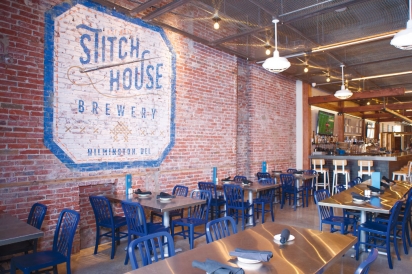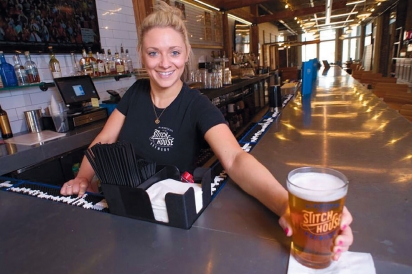Renaissance Man: Dan Sheridan and Stitch House Brewery
Hundreds of green-clad partiers raged inside Stitch House Brewery. It was 3:30 p.m. on St. Patrick’s Day, and the downtown Wilmington brewpub hummed with a kinetic excitement.
On the rows of televisions above the 30-foot zinc-top bar and the wooden communal tables, NCAA tournament basketball played. Eventual national champions Villanova had just pounded No. 9 Alabama to advance to the Sweet 16, adding to the crowd’s lather.
Back in the kitchen, chef-owner Dan Sheridan was keeping it cool, all things considered. Like an air traffic controller in black Crocs and a backward black hat, he directed the small army of cooks and servers through the chaos of Stitch House’s first full day of business.
“Me and the guys keep waiting for a lull or for people to settle in for their meals,” he says with a smile. “It hasn’t happened.”
Sheridan’s kitchen handled the feeding frenzy well. Their Reuben sandwiches, loaded fries, and nachos flew into the 200-seat dining room while orders continued to buzz through onto the monitor and deep into the night.
That was just the beginning. All around Sheridan and Stitch House Brewery, in the heart of downtown Wilmington, the frenzy is spreading.
The 7,000-square-foot brewpub—which occupies a large and tactically vital spot on Wilmington’s Market Street—represents a major lynchpin for the city’s revitalization efforts. The powers-that-be around the state’s largest city, from lawmakers to real estate giants, are banking on 35-year-old native Wilmingtonian Sheridan to deliver the ever-elusive young professional crowd and help galvanize a multi-million-dollar development boom.
For decades, this chunk of Wilmington has cemented its reputation as a hub for finance, corporate litigation, and a cozy HQ for some of the area’s largest employers. But more often than not, the people who came to work here every day commuted home at 5 o’clock to the unincorporated suburbs outside of town.
But over the last decade or so, a perfect storm of revitalization efforts— from new apartments, trendy bars, boutiques and Starbucks, to enhanced parking and security—has, after decades of fits and starts, finally injected the city with a palpable vibration. By the time Stitch House opened in March following an excruciatingly long two-year build-out of what was once a linen store, the city felt ready to explode.
“This is the most important restaurant in a long time that’s opened in Downtown Wilmington,” says Patrick Callahan, founder and CEO of Compass Red, a data and analytics company, and a board member of Governor John Carney’s new economic development super-team, the Delaware Prosperity Partnership.
Callahan, who’s already become a regular at Stitch House, says it’s one of the few places in town where he doesn’t run into people he knows; a testament to the brewpub’s diverse clientele. “That crowd is priming the pump for the city,” he says. “Something is changing in Wilmington. I fundamentally believe that. I don’t know what it is. I think it’s primed and ready to take off.” It’s fair to say the pump has been priming for a long while.
Despite its substantial progress, Wilmington still often seems dogged by its reputation. For violence, for crime, for a perceived lack of late-night options, lighting, or parking.
Last year the city set new high marks for both shootings and homicides since The New Journal started tracking the stats in 2011. Wilmington frequently appears on “Most Dangerous Cities” lists alongside regional neighbors like Camden, N.J. and Chester, Pa.
Market Street, one of the city’s oldest and most prestigious arteries, has absorbed plenty of collateral damage over the years. Flanked by the stately Grand Opera House on one end, and a Delaware Tech campus on the other, it’s been notoriously rough on small businesses—particularly bars and restaurants. Crowds rarely endured beyond happy hour in most places, and few stayed open til closing time.
Realizing the future of their city was driving away from it every single night, development and real estate tycoons like the Buccini/Pollin Group helped Wilmington change course by investing hundreds of millions of dollars into new and refurbished housing. Even at Stitch House, which calls Buccini/Pollin its landlord, seven industrial loft-style apartments are housed in its upper floors.
Martin Hageman, executive director of the city’s non-profit business group Downtown Visions, estimates that about 200 people lived in downtown Wilmington five years ago, and that by next year somewhere around 3,000 could be calling it home. Even more boutique amenities, like liquor stores, grocery shops and bodegas could be on the way in.
“It’s a very important piece of the economic development puzzle downtown,” Hageman says, “and a catalyst for future growth, which is going to be happening faster than anyone can anticipate. A lot of that has to do with the opening of the Stitch House.”
Hageman, who’s held his post for 23 years, says the city is starting to shake off its white tablecloth persona—remnants of the old guard who pumped money into the city through such conduits as the Delaware Symphony Orchestra or the Dupont Theater. “But this is a whole other niche,” he says. The local beer, the atmosphere, this is just culturally very different from what we’ve previously experienced downtown. Makes us a more exciting place to be.”
And while crowds are relatively easy to come by on St. Paddy’s Day, there’s hope that Stitch House, along with a handful of other hip new spots, will continue attracting visitors and potentially hundreds of new neighbors into the summer and beyond.
At the center of it all is Sheridan, whose friends sometimes tease him if they catch him anywhere outside of his hometown. “Why would I leave?” he says. “I have everything I need here.”
“His soul is in the town and he’s always been a huge believer in this city, even when others weren’t,” says William Hoffman, co-owner of House of William and Merry and Sheridan’s former colleague at the revered Green Room inside the Hotel du Pont.
Born in Bogotá, Colombia, Sheridan was adopted by a couple from Wilmington. Once in his new hometown, he latched on heavy. His adopted father, John Sheridan, was Wilmington’s City Solicitor under former Mayor Jim Baker, and was a fixture in the city’s Law Department since the 70s.
The family grew up in Forty Acres, one of Wilmington’s signature neighborhoods, known for its Irish heritage, 19th century row homes, and brick walkways. As a teen, Dan and his friends would sneak into wood-paneled neighborhood haunts like Gallucio’s—“making it in half the time,” he says—for cheap beer and pizza. He landed his first restaurant gig at nearby Kelly’s Logan House, an anchor in the city’s Trolley Square area since 1864. Once he was old enough, he’d lend a hand at barbecues hosted by “Uncle” Dan Frawley—Wilmington’s former mayor, and Sheridan’s namesake.
“Being around all those bright people who cared deeply about the city—I always grew up thinking Wilmington was the best,” says Sheridan. “Everyone my dad hung around with loved the city, and so, so did I.”
After graduating from the University of Delaware, Sheridan went onto Le Cordon Bleu in Sydney, Australia, subsequently landing in the kitchens of some of the planet’s most renowned restaurants like Aria and Pielows.
Eventually, Delaware beckoned him back. Like a lot of chefs, he was itinerant. Beyond the fabled Green Room, he worked under Bryan and Andrea Sikora at their acclaimed La Fia, along with popular places like Big Fish Grill and Cantwell’s Tavern, in Odessa.
But something was gnawing at him. “Whether subconsciously or not, I started realizing my heart wasn’t in those places, my friends didn’t even hang out in those places—a place like Hotel du Pont, where you’ve gotta wear a jacket to dinner.”
So he took matters into his own hands. While working at Cantwell’s, Sheridan rented some kitchen space and begun jarring his delicious recipe for pickles. That tiny business—Wilmington Pickling Company, begat another one, Locale BBQ Post, in 2015. By then, Sheridan and his wife Katie had welcomed their first child Helmsley into the world.
“You can’t cook til you’re 75,” he says. “You either gotta start teaching or move up the chain before you get burnt out.”
Meanwhile, big bucks and bigger plans were pumping into the city. Eventually, the development giants reached out to the barbecue chef and the spark was lit.
For those who live or work in the city, the resulting Stitch House, and especially its onsite brewery, felt like a touchdown celebration.
Long communal tables that cut through the middle of the dining room celebrate Wilmington’s neighborhood-y DNA. The food? Like most of Sheridan’s oeuvre, it’s approachable and comforting, and reliant on great ingredients and an everything-from-scratch pathos. He takes aim at the business lunch crowd with a robust sandwich board—ranging from the aforementioned Reubens made from beer-brined corned beef, fried green tomato BLTs, and short rib paninis. For dinner Sheridan keeps it light, focusing on smaller plates—like pillowy seared scallops bobbing in sweet potato puree and cranberry chutney.
“It’s just so perfect for Wilmington,” says Hoff man. “It’s got that gastropub feel, the beer is there, and it’s not trying to be something it’s not. And that’s a simple, chill vibe, whether you’re doing something light or substantial.”
It’s a place that Sheridan can imagine he and his friends hanging out. “I don’t even look at entree portions anymore,” he says. Weeks into opening, Stitch House and its adopted native son felt like it had tapped into the city’s collective pulse.
As construction crews continue to reshape the city around him, Sheridan and his team are feeding a growing sense of hope.
Finally basking in its youthful glow, for Delaware’s largest city, a tipping point feels imminent.
829 North Market Street, Wilmington, Delaware, (302) 250-4280 Learn more at stitchhousebrewery.com and follow on Facebook and Instagram












